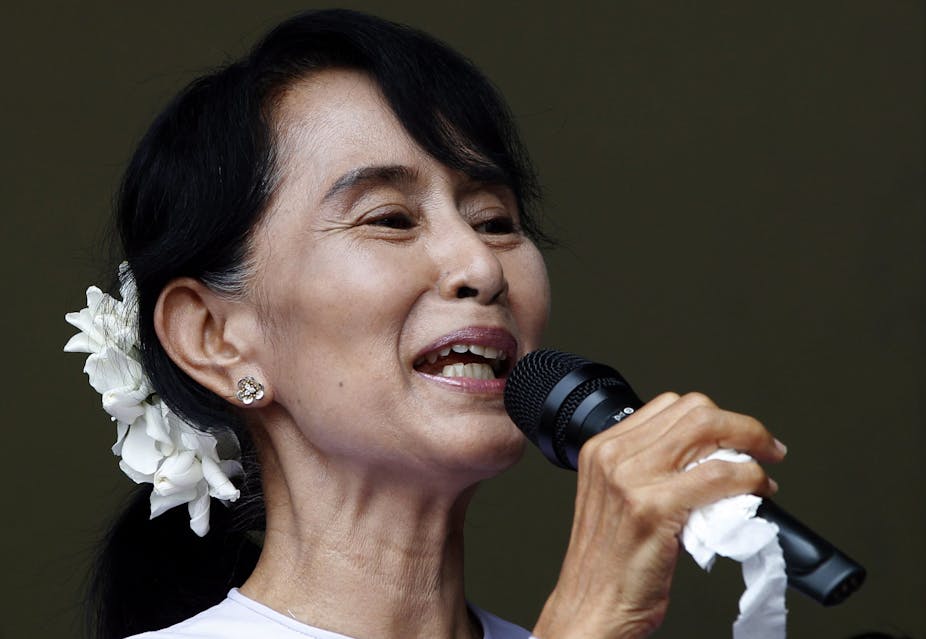The by-elections held throughout Burma/Myanmar on 1 April initially look to have produced a stunning result for the National League for Democracy (NLD) and its leader, Daw Aung San Suu Kyi.
It was stunning for everyone, including for the party itself and the military which has ruled the country for just over 50 years.
Many commentators have already written off the election results as a nice exercise in window-dressing, but the elections have proved a sure sign of the NLD’s legitimacy and the commitment to reform given by President Thein Sein.
The results
There were 45 seats being contested at the by-elections, with the NLD nominated candidates ultimately contesting 44. Exit polls indicated that the NLD might have won all but one of them, with the other seat likely to be won by a Shan ethnic party and the 45th seat by another Shan grouping. The governing Union Solidarity and Development Party (USDP) looks to have won none.
The full results from the Elections Commission are not yet available, but the NLD appears to have won all four seats in the country’s capital which were thought by everyone, including the NLD, to be firmly under the ruling party.
The NLD’s wins also include all but one of the seats in ethnic regions where many had thought political parties with a strong ethnic base would prevail. There is still one unclear seat is in Lashio, but this has been claimed by another Shan regional democracy party.
If the results are as anticipated, it will also show the NLD has even won seats with heavy military populations.
Positive signs
Many have undervalued these elections, saying that the parliament is toothless and the real power still resides with the military.
The Myanmar constitution gives 25% of the parliamentary seats to the military. President Thein Sein is a former general and most of the cabinet are also retired military figures. Importantly, the military can wield power through state institutions like the National Defence and Security Council which has wide-ranging powers and is well-positioned to maintain direct influence on much legislation and many appointments.
President Thein Sein has, however, taken the country on a reformist course which many observers still for some reason find hard to acknowledge. He made his intentions very clear when he delivered a speech with vision at its heart on assuming the Presidency in March 2011.
This vision included the functioning of the country’s parliamentary institutions as representative assemblies – the members were reminded of their duty to know their constituents and their needs, and ministers were reminded that they were accountable to the parliament.
A new generation
Thein Sein at almost 67 is a generation younger than his predecessor, and many of those close to him are younger still.
This is the parliament which is now likely to have as many as 43 members from the NLD. All are inexperienced and some youthful. Many ran in constituencies without a prospect of success as training for future political careers.
Some are also still adapting to life in the open after being imprisoned for their political opinions until Thein Sein gave them liberty in January this year. They will have a larger task still in adapting themselves to being part of the design process which will set Myanmar’s future.
Confronting the future
These new politicians and leaders will have to confront the biggest decisions for Burma/Myanmar in over 50 years.
There are many questions that these new politicians and the ruling party will have to now answer. Firstly, will Thein Sein seek to bring the NLD into the ranks of government, and might that mean a position for Aung San Suu Kyi?
It is unlikely that she would be keen to accept such a position. It would limit her ability to function freely in debate about her country’s future. It is, however, possible that some NLD members or sympathisers might be brought into government to broaden its base in recognition of the popular support made obvious by the voting on April 1.
As the new politicians adjust to life in Myanmar’s parliament, so too will the military and its hard-liners have to adjust to the legitimacy of the NLD, and its role in policy making. But the people have spoken so clearly now, that it looks like they have little choice but to accept it.

